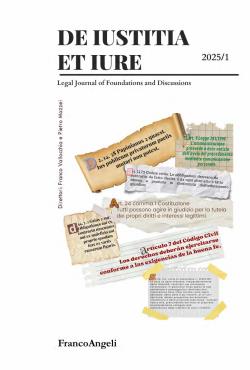Fascicolo 1/2025
Editoriale
Sezione I - Violenza domestica e di genere
- Simona Feci, Diritto di correzione e violenza domestica. Il tracciato delle fonti storico-giuridiche.
- Pietro Mazzei, Violenza di genere: spunti di riflessione su profili giuridici, criticità applicative e prospettive di riforma
- Antonia Antonella Marandola, Il "processo" alla violenza di genere
Sezione II - Rinuncia abdicativa del diritto di proprietà immobiliare
- Antonio Angelosanto, La rinuncia alla proprietà immobiliare al di là dei «diritti soggettivi» e delle «persone giuridiche»: spunti di riflessione in margine all’esperienza giuridica di Roma
- Antonio Tommaso De Mauro, La rinuncia alla proprietà tra istanze egoistiche e funzione sociale
- Maurizio D’Errico, Marko Di Vincenzo, Mariaconcetta Trapani, L’ammissibilità della rinuncia abdicativa al vaglio delle Sezioni Unite della Corte di Cassazione
